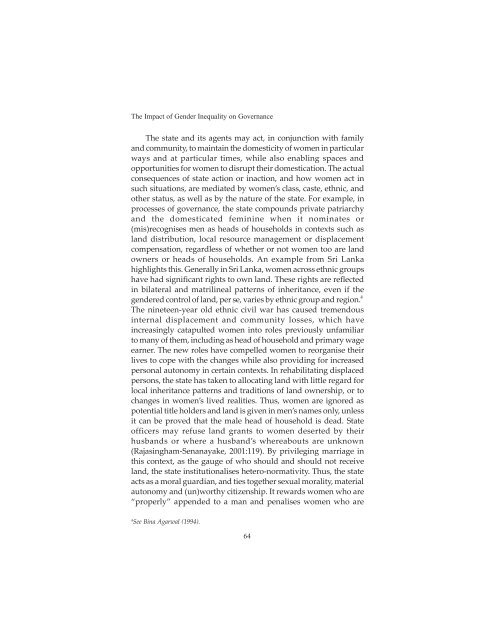Essays On Gender And Governance - United Nations Development ...
Essays On Gender And Governance - United Nations Development ...
Essays On Gender And Governance - United Nations Development ...
You also want an ePaper? Increase the reach of your titles
YUMPU automatically turns print PDFs into web optimized ePapers that Google loves.
The Impact of <strong>Gender</strong> Inequality on <strong>Governance</strong><br />
The state and its agents may act, in conjunction with family<br />
and community, to maintain the domesticity of women in particular<br />
ways and at particular times, while also enabling spaces and<br />
opportunities for women to disrupt their domestication. The actual<br />
consequences of state action or inaction, and how women act in<br />
such situations, are mediated by women’s class, caste, ethnic, and<br />
other status, as well as by the nature of the state. For example, in<br />
processes of governance, the state compounds private patriarchy<br />
and the domesticated feminine when it nominates or<br />
(mis)recognises men as heads of households in contexts such as<br />
land distribution, local resource management or displacement<br />
compensation, regardless of whether or not women too are land<br />
owners or heads of households. An example from Sri Lanka<br />
highlights this. Generally in Sri Lanka, women across ethnic groups<br />
have had significant rights to own land. These rights are reflected<br />
in bilateral and matrilineal patterns of inheritance, even if the<br />
gendered control of land, per se, varies by ethnic group and region. 4<br />
The nineteen-year old ethnic civil war has caused tremendous<br />
internal displacement and community losses, which have<br />
increasingly catapulted women into roles previously unfamiliar<br />
to many of them, including as head of household and primary wage<br />
earner. The new roles have compelled women to reorganise their<br />
lives to cope with the changes while also providing for increased<br />
personal autonomy in certain contexts. In rehabilitating displaced<br />
persons, the state has taken to allocating land with little regard for<br />
local inheritance patterns and traditions of land ownership, or to<br />
changes in women’s lived realities. Thus, women are ignored as<br />
potential title holders and land is given in men’s names only, unless<br />
it can be proved that the male head of household is dead. State<br />
officers may refuse land grants to women deserted by their<br />
husbands or where a husband’s whereabouts are unknown<br />
(Rajasingham-Senanayake, 2001:119). By privileging marriage in<br />
this context, as the gauge of who should and should not receive<br />
land, the state institutionalises hetero-normativity. Thus, the state<br />
acts as a moral guardian, and ties together sexual morality, material<br />
autonomy and (un)worthy citizenship. It rewards women who are<br />
“properly” appended to a man and penalises women who are<br />
4<br />
See Bina Agarwal (1994).<br />
64

















